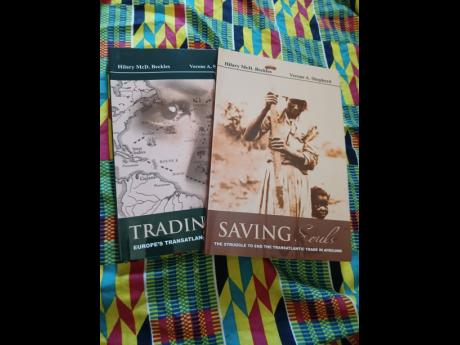‘Trading Souls’, ‘Saving Souls’ – Two refreshing volumes on slavery and emancipation
THE GREAT majority of the Jamaican people are descendants of Africans who were forcibly removed from their homeland and transported across the Atlantic in overcrowded vessels to work on plantations owned by Europeans in a brutal system of chattel slavery, perhaps the greatest tragedy of known human history, which came to an official end in 1838.
Social, humanitarian and economic reasons are proffered for its demise, two years earlier than was planned. The volumes on the system itself and its emancipation are endless. But who is telling the narratives, and what are their motives? For, it is not a cut-and-dry matter; it is complicated and complex, vexatious and vehement.
And since 2007, Hilary McD. Beckles and Verene A. Shepherd, through Ian Randle Publishers, have published two volumes, Trading Souls – Europe’s Transatlantic Trade in Africans and Saving Souls – The Struggle To End The Transatlantic Trade in Africans, that clearly put the matter into perspective. It’s about calling out the lies, silence and denials, setting the records, and giving the victims a voice.
Both are tagged as ‘a bicentennial Caribbean reflection’, coinciding with the 200th anniversary of the 1807 abolition of the Slave Trade Act, with the same forword by former Prime Minister of Jamaica and former Chairman of CARICOM, P. J. Patterson. At the time of publication, Beckles was professor of history and principal of the Cave Hill campus of The University of the West Indies (UWI), and Shepherd was professor of social history on the Mona campus of The UWI.
“The Transatlantic Trade in Africans (TTA) has no equal in the annals of modern history in terms of the scope and depth of suffering experience by its victims, mostly at the hands of European traders and enslavers. Yet, denial and silence continue to surround this human tragedy … Trading Souls, like its companion volume, Saving Souls, is a reflection upon a history that was terrible and turbulent and tries to make sense of the silence and denial even as it seeks to break it,” the publishers write on the glossy paperback back cover of the 117-page Trading Souls.
Inside, the writers look at the global origins and development of slavery, Africa in world development before the transatlantic trade in Africans, Africanisation of the trade – the transatlantic context, financial and commercial organisation, volume and variations, the Middle Passage – death and survival, prices and profitability, and the transatlantic trade and African economic decline. The conclusion focuses on the transatlantic trade and western economic development.
In the introduction, Beckles and Shepherd write, “Over 15,000,000 enslaved Africans were shipped across the Atlantic to the Americas between 1492 and 1870. This trade was the largest forced human migration in recorded history. The extent of human suffering associated with this involuntary relocation of men, women, and children may never be known. But their shipment, packed and stored beneath the decks of ships like commodities, constitutes one of the greatest horrors of modern times.”
For Saving Souls, the publishers say, “The process of terminating the European Transatlantic Trade in Africans (TTA) was long and drawn-out. Although Africans, included the enslaved, had long resisted its operation, abolition has traditionally been presented as a benevolent act by the British state acting under pressure from the intellectual classes and humanitarian activists. But the campaign to end the TTA cannot be separated from the resistance struggle of the Africans themselves.”
This volume explores the structure and conduct of the trade in African people, details of the resistance of Africans to capture, enslaved and free, male and female, Christian and non-Christian, and the legacies of the 1807 Act. It also consists of the final abolition acts, namely, the 1805-1806 order-in-council and the 1807 Act as appendices for easy reference.
“It was materialistic greed that motivated this crime against humanity. From the end of the 15th century to the end of the 19th century, the labour of enslaved victims, in addition to that of their progeny, contributed significantly to the economic modernisation and cultural transformation of the Atlantic world that became home to the first transnational industrial complex … Caribbean historians have a responsibility to tell the story of abolition so that it reflects the contribution of the victims of this trade, even while acknowledging the critical role of British abolitionists in the abolition movement,” the authors say in the introduction.
In the foreword, P. J. Patterson says, inter alia, “Despite the challenges, the authors and supporters of this publication, as well as the leaders of the bicentennial commemorative planning committees across the Caribbean must press on with their efforts to educate Caribbean people about a past, which, while painful, provided important lessons about how our ancestors overcame adversity and left us a cultural legacy that has sustained us through trying times.”
Chattel slavery and emancipation from it are part of our Jamaican story, and Heritage Week and Heroes Day are a few weeks away. Trading Souls and Saving Souls are excellent media through which we might reflect on their legacies when they come.

